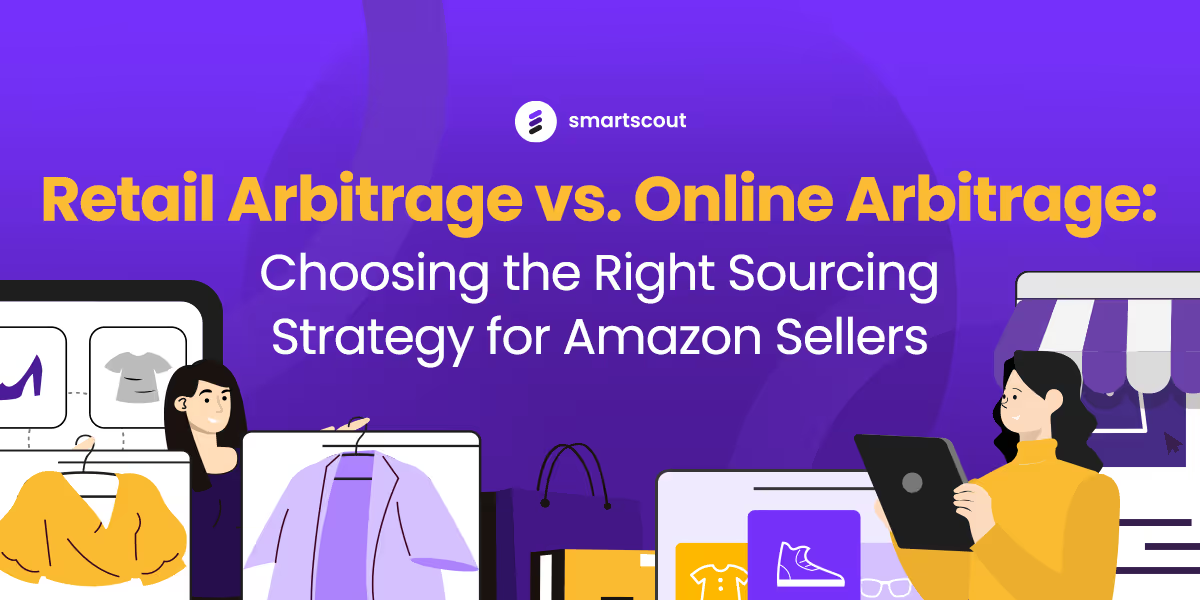As an Amazon seller, choosing the right sourcing strategy can greatly impact your success. Two popular options that offer distinct advantages are retail arbitrage and online arbitrage. While both involve buying products for resale, they differ in their approach.
Let's look at the pros and cons of retail arbitrage and online arbitrage, discuss how sellers can get started with each strategy, and address some of the challenges associated with both methods.
Understanding Retail Arbitrage and Online Arbitrage
Before diving into the comparison, let's first define the two strategies:
Retail Arbitrage:
Retail arbitrage involves purchasing products from brick-and-mortar retail stores at a discount and then reselling them on Amazon at a higher price. This strategy capitalizes on discrepancies in pricing between different marketplaces or clearance sales in physical stores.
Online Arbitrage:
Online arbitrage follows a similar concept but takes place entirely on the internet. Sellers source products from various online retailers or e-commerce platforms at discounted prices and resell them on Amazon for a profit.
Getting Started with Retail Arbitrage and Online Arbitrage
Retail Arbitrage:
Many people start their Amazon selling journey with retail arbitrage, as it requires a lower initial investment and provides a hands-on approach to product sourcing. To get started, you'll need a scanning app on your smartphone, such as the Amazon Seller App, to quickly check product prices and sales ranks while you're inside the store.
Scanning apps help you identify profitable items by comparing the store's price with the current price on Amazon. As you gain experience, you'll develop a better understanding of which products are worth sourcing and what types of stores offer the best deals.
Online Arbitrage:
Online arbitrage is also relatively easy to start, as it can be done from the comfort of your own home. Begin by visiting online retailers and e-commerce platforms to search for discounted products. To save time and increase efficiency, you may consider using specialized online arbitrage tools such as Tactical Arbitrage, which can help you identify profitable deals across multiple websites.
Challenges of Retail Arbitrage and Online Arbitrage
Both retail and online arbitrage come with their own unique challenges:
Retail Arbitrage:
- Store managers may restrict the quantity of items you can purchase if they suspect you're buying in bulk for resale purposes. This can limit the number of profitable products you can source at once.
- Physical stores may have limited stock, making it difficult to find enough items to sell.
Online Arbitrage:
- Websites may prevent you from checking out with high quantities, blocking you from purchasing in bulk. This can be a significant obstacle when trying to source large quantities of a product for resale.
- Shipping costs can be higher when sourcing products from multiple online retailers, which may affect your profit margins.
Comparing Retail Arbitrage and Online Arbitrage
Sourcing Opportunities:
- Retail arbitrage relies on local deals and clearance sales, which can be limited by the physical location and availability of retail stores in your area.
- Online arbitrage offers a broader selection of products from a wide range of online retailers and e-commerce platforms.
Scalability:
- Retail arbitrage is generally less scalable due to the time-consuming nature of visiting multiple stores and the limited availability of products in each location.
- Online arbitrage is more scalable, as it allows you to source products from various online retailers and automate or outsource tasks as your business grows.
How To Get an Edge?
SmartScout is a powerful tool that streamlines the product sourcing process for both retail arbitrage and online arbitrage sellers on Amazon.
By providing extensive data and insights on products, categories, and market trends, SmartScout helps sellers identify profitable deals and make informed decisions about which items to source. Its advanced filtering options and a user-friendly interface allow sellers to analyze product opportunities, saving valuable time and resources efficiently.
Whether you're a retail arbitrage seller scanning physical store shelves or an online arbitrage seller scouring various e-commerce platforms, SmartScout is an invaluable tool for optimizing your sourcing strategy and maximizing your Amazon business's potential.
Conclusion
The choice between retail arbitrage and online arbitrage as a sourcing strategy for Amazon sellers ultimately depends on various factors and individual preferences.
Retail arbitrage offers the advantage of immediate access to products, the ability to inspect items in person, and potential for unique finds. However, it may require more time and effort for scouting and dealing with physical inventory.
On the other hand, Online arbitrage provides a wider range of products, scalability, and the convenience of purchasing from the comfort of your home. It allows sellers to leverage technology and tools to streamline the sourcing process. However, it may involve increased competition and challenges in product verification.
Ultimately, successful sourcing on Amazon requires careful consideration of factors such as budget, available time, desired scalability, competition levels, and personal preferences. Some sellers even choose to combine both strategies to diversify their product offerings and maximize opportunities.
Whichever strategy you choose, it is crucial to conduct thorough research, stay informed about market trends, and continuously adapt your sourcing approach to meet the evolving demands of the platform. Remember that the key to success lies in a deep understanding of your target market, effective inventory management, using the right tools, and providing value to customers.










